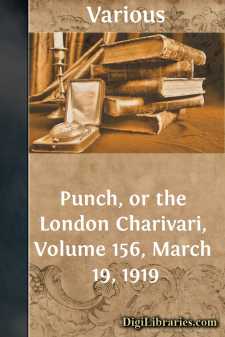Categories
- Antiques & Collectibles 13
- Architecture 36
- Art 48
- Bibles 22
- Biography & Autobiography 813
- Body, Mind & Spirit 142
- Business & Economics 28
- Children's Books 17
- Children's Fiction 14
- Computers 4
- Cooking 94
- Crafts & Hobbies 4
- Drama 346
- Education 46
- Family & Relationships 57
- Fiction 11829
- Games 19
- Gardening 17
- Health & Fitness 34
- History 1377
- House & Home 1
- Humor 147
- Juvenile Fiction 1873
- Juvenile Nonfiction 202
- Language Arts & Disciplines 88
- Law 16
- Literary Collections 686
- Literary Criticism 179
- Mathematics 13
- Medical 41
- Music 40
- Nature 179
- Non-Classifiable 1768
- Performing Arts 7
- Periodicals 1453
- Philosophy 64
- Photography 2
- Poetry 896
- Political Science 203
- Psychology 42
- Reference 154
- Religion 513
- Science 126
- Self-Help 84
- Social Science 81
- Sports & Recreation 34
- Study Aids 3
- Technology & Engineering 59
- Transportation 23
- Travel 463
- True Crime 29
Punch, or the London Charivari, Volume 156, March 19, 1919
by: Various
Categories:
Description:
Excerpt
THE MUD LARKS.
Yesterday morning, a freckled child, dripping oil and perspiration and clad in a sort of canvas dressing-gown, stumbled into "Remounts" (or "Demounts," as we should more properly call ourselves nowadays) and presented me with a slip of paper which entitled him, the bearer, to immediate demobilisation on pivotal grounds. I handed it back to him, explaining that he had come to the wrong shop—unless he were a horse, of course. If he were and could provide his own nosebag, head-stall and Army Form 1640, testifying that he was guiltless of mange, ophthalmia or epizootic lymphangitis, I would do what I could for him.
He stared at me for a moment, then at the slip, then, murmuring something about the mistake being his, began to feel in the numerous pouches of his dressing-gown, bringing to light the following items:—
(1) A. spanner.
(2) Some attenuated cigarettes.
(3) A picture-postcard fashioned in silk, with tropical birds and flowers, clasped hands, crossed Union Jacks and the legend "TRUE LOVE" embroidered thereon.
(4) A handful of cotton waste.
(5) Some brandy-balls.
(6) An oil-can.
(7) The ace of spades.
(8) The portrait (tin-type) of a lady, inscribed "With kind regards from Lizzie."
(9) A stick of chewing gum.
(10) A mouse (defunct).
(11) A second slip of paper.
He grunted with satisfaction, replaced his treasures carefully in the pouches and handed the last-named item to me. It read to the effect that both he and his car were at my disposal for the day. I wriggled into a coat and followed him out to where his chariot awaited us.
I never pretended to be a judge of motor vehicles, but it does not need an expert to detect a Drift when he sees one; they have a leggy, herring-gutted appearance all their own. Where it was not dented in it bulged out; most of those little knick-knacks that really nice cars have were missing, and its complexion had peeled off in erratic designs such as Royal Academicians used to smear on transports to make U-Boaters imagine they were seeing things they shouldn't and lead better lives.
I did not like the looks of the thing from the first, and my early impressions did not improve when, as we bumped off the drive on to the pavé, the screen suddenly detached itself from its perch and flopped into our laps.
However, the car put in some fast work between our château gates and the estaminet of the "Rising Sun" (a distance of fully two hundred yards), and my hopes soared several points. From the estaminet of the "Rising Sun" to the village of Bailleul-aux-Hondains the road wriggles down-hill in two sharp hair-pin bends. The car flung itself over the edge of the hill and plunged headlong for the first of these.
"Put on the brakes!" I shouted.
The child did some kicking and hauling with his feet and hands which made no impression whatever on the car.
"Put on the brakes, damme!" I yelled.
The child rolled the whites of his eyes towards me and announced briefly, "Brake's broke."
I looked about for a soft place to jump. There was none; only rock-plated highway whizzing past....












